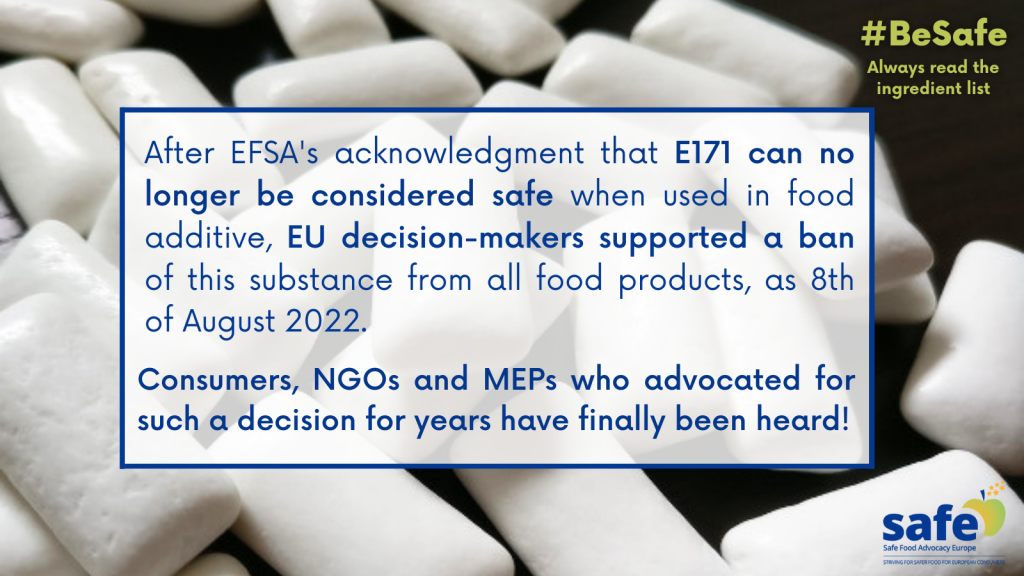Titanium dioxide (TiO2), also known as E171, is very commonly used as a white colourant in food, but also in paints, coatings, pharmaceuticals, cosmetics, and even in toothpaste. E171 is a mix of TiO2 particles which can be defined as nanoparticles. Because of their extremely small size, nanoparticles can squeeze through natural protective barriers of the human body and pass into the liver, lungs or the whole digestive system.
According to EU law, a food additive may be authorised if it does not pose a safety concern to the health of consumers, if it is technologically needed and if it does not mislead consumers. However, E171 serves no technological purpose and is only used for aesthetic reasons.
Thanks to the strong action of European civil society, and namely the advocacy work of NGOs such as SAFE, the substance was finally banned in 2021. This ban will come into effect on 8 August 2022.
After years of intensive mobilisation, NGOs and European consumers deeply welcomed this decision!

Background of the campaign on E171 ban
France was the first EU Member State to express concerns regarding the toxicity of E171. As a result of a detailed report from the French Agency for Food, Environmental and Occupational Health & Safety (ANSES), the French government considered that the health risks for consumers linked with E171 were serious enough to lead to a ban as of January 2020. Following this decision, European civil society asked for the precautionary principle to also be applied at EU level, to remove E171 from the EU list of permitted food additives.
In an open letter to the European Commission Vice-President Jyrki Kaitanen, sent on 3rd May 2019, more than 36 European and national NGOs supported the French ban on E171.
Civil society groups across Europe raised questions about the industry’s involvement in the process and warned against lobbying efforts from the industry to minimize the potential health threats posed by E171.
NGOs advocated for EFSA to give more weight and consideration to independent studies backed by official and national authorities than to those produced by the manufacturers who hold financial interests. Indeed, in the best interests of all EU consumers, it is always utterly crucial to avoid conflicts of interests and to observe a true independence in the decision-making process of EFSA.
On 7 September 2021, the ENVI Committee of the European Parliament voted to object the new specifications proposed by the European Commission on E171. A month later, on 7 October 2020, the European Parliament voted in plenary session to support the objection. SAFE welcomed these votes, as MEPs put the health of European consumers at the centre of their decision.
Then, on 6 May 2021, The European Food Safety Authority (EFSA) published its long-awaited safety assessment of titanium dioxide used as a food additive E171. It clearly underlined that titanium dioxide has the potential to induce DNA stand breaks and chromosomal damage, a concern for genotoxicity could not be ruled out. Therefore, the expert panel of EFSA concluded that E171 “can no longer be considered safe when used as a food additive”.
Following that assessment, the European Commission made a proposal to ban food additive E171. Finally, on 8 October 2021, the Standing Committee on Plant, Animal, Food and Feed (SCoPAFF) voted in favour of the proposal and banned E 171 from all applications in food products.
SAFE constantly reminded that EU consumers’ health should always be protected and put first!
Read our communications here:
In the European Parliament:
Many Members of the European Parliament stepped forward against titanium dioxide in food in recent months. In December, 34 MEPs call for an extension of the French ban in a open Joint letter to EU commissioner Stella Kyriakides (17 December 2019).



